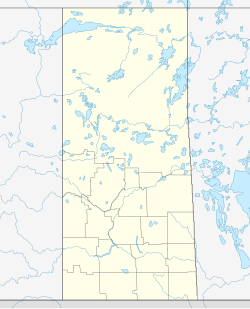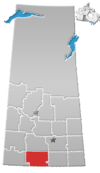Gravelbourg
Gravelbourg | |
|---|---|
Town | |
| Town of Gravelbourg | |
 Main Street | |
| Coordinates: 49°52′22″N 106°33′13″W / 49.87278°N 106.55361°W | |
| Country | Canada |
| Province | Saskatchewan |
| Rural municipality | Gravelbourg No. 104 |
| Post office Founded | 1907 |
| Incorporated (Town) | 1916[1] |
| Government | |
| • Mayor | Mathieu Forest |
| • Town Manager | Carol White |
| • Governing body | Gravelbourg Town Council |
| • MLA | Dave Marit |
| • MP | Jeremy Patzer |
| Area | |
• Total | 3.23 km2 (1.25 sq mi) |
| Population (2011[2]) | |
• Total | 1,116 |
| • Density | 346.0/km2 (896/sq mi) |
| Time zone | UTC−06:00 (CST) |
| Postal code | S0H 1X0 |
| Area code | 306 |
| Highways | 43, 58, and 13 |
| Waterways | Wood River |
| Website | www |
| [3][4][5] | |
Gravelbourg (/ˈɡrævəlbərɡ/) is a small multicultural town in south-central Saskatchewan, Canada. It is located just west of the Wood River at the junction of provincial Highway 43 and Highway 58, approximately 125 kilometres from Moose Jaw, Swift Current, and the United States border. The region served as a path for First Nations peoples many years ago, and was also integrated into the Redcoat Trail of the 19th century. Gravelbourg is now a key link on the 21st century Trans Canada Trail.
Gravelbourg is also referenced in the fourth verse of the North American version of "I've Been Everywhere", written by Geoff Mack and made popular in North America by Hank Snow and more recently Johnny Cash.
History
[edit]

Gravelbourg was settled in the early 1900s and was one of the French block settlements of the Gravelbourg-Lafleche-Meyronne area in southwestern Saskatchewan,[6] In 1930 it became the cathedral city of the Roman Catholic diocese of Gravelbourg.[7][8]
Gravelbourg carries the name of its founder Abbé Louis-Pierre Gravel.[9] Louis-Pierre Gravel was designated a Person of National Historic Significance in 1956.[10] The inscription on the monument in Gravelbourg built in 1958 to honour him reads:
"Between 1906 and 1926 more than ten thousand Canadian citizens, many of whom were then living in the United States, answered the call of Reverend Louis-Pierre Gravel to make their homes on the broad plains of Saskatchewan where they built towns and established French-speaking cultural institutions." Parks Canada[10]
Gravelbourg celebrated its centennial in 2006.
Gravelbourg celebrates its many cultures at its annual Summer Solstice Festival d'été Archived 8 April 2014 at the Wayback Machine.
Historic buildings
[edit]A number of heritage buildings are located within the community.
Our Lady of the Assumption Roman Catholic Cathedral, the former Convent of Jesus and Mary and the former Bishop's Residence were designated the Gravelbourg Ecclesiastical Buildings National Historic Site of Canada in 1995.[11]
Gravelbourg Court House,[12] College Mathieu Pavilion,[13] Gravelbourg Post Office,[14] Gaiety Theatre and[15] Canadian National Railway Station[16] are also listed heritage sites.
Demographics
[edit]In the 2021 Census of Population conducted by Statistics Canada, Gravelbourg had a population of 986 living in 438 of its 482 total private dwellings, a change of -9% from its 2016 population of 1,083. With a land area of 3.12 km2 (1.20 sq mi), it had a population density of 316.0/km2 (818.5/sq mi) in 2021.[17]
| 2021 | 2011 | |
|---|---|---|
| Population | 986 (-9.0% from 2016) | 1,116 (2.5% from 2006) |
| Land area | 3.21 km2 (1.24 sq mi) | 3.23 km2 (1.25 sq mi) |
| Population density | 307.1/km2 (795/sq mi) | 346.0/km2 (896/sq mi) |
| Median age | 47.2 (M: 45.2, F: 50.4) | 49.4 (M: 47.9, F: 50.8) |
| Private dwellings | 482 (total) 438 (occupied) | 516 (total) |
| Median household income | $73,000 | $Not Available |
In the 2011 Canada Census, out a total of 1,116 residents 625 chose English while 300 chose French as their mother tongue. Thirty nine percent or 430 residents spoke both English and French.[2] Gravelbourg's French-language Fransaskois community is the subject of a short documentary Les Fransaskois, produced for the documentary series The Grasslands Project.[22]
Other languages spoken in Gravelbourg were: Bisayan languages (5), Chinese (10), Dutch (5), German (15), Korean (5), Lao (5), Spanish (5), Swahili (5) and Tagalog (Pilipino, Filipino) (50).[2]
Climate
[edit]| Climate data for Gravelbourg | |||||||||||||
|---|---|---|---|---|---|---|---|---|---|---|---|---|---|
| Month | Jan | Feb | Mar | Apr | May | Jun | Jul | Aug | Sep | Oct | Nov | Dec | Year |
| Record high °C (°F) | 12.8 (55.0) |
18.0 (64.4) |
24.0 (75.2) |
35.0 (95.0) |
37.0 (98.6) |
41.5 (106.7) |
42.8 (109.0) |
41.7 (107.1) |
39.4 (102.9) |
33.5 (92.3) |
22.8 (73.0) |
20.6 (69.1) |
42.8 (109.0) |
| Mean daily maximum °C (°F) | −7.4 (18.7) |
−4.0 (24.8) |
3.3 (37.9) |
12.5 (54.5) |
19.4 (66.9) |
24.0 (75.2) |
26.7 (80.1) |
26.1 (79.0) |
19.0 (66.2) |
12.5 (54.5) |
1.3 (34.3) |
−5.8 (21.6) |
10.6 (51.1) |
| Daily mean °C (°F) | −12.5 (9.5) |
−9.3 (15.3) |
−2.3 (27.9) |
5.5 (41.9) |
12.1 (53.8) |
16.8 (62.2) |
19.0 (66.2) |
18.3 (64.9) |
11.8 (53.2) |
5.9 (42.6) |
−3.8 (25.2) |
−10.8 (12.6) |
4.2 (39.6) |
| Mean daily minimum °C (°F) | −17.5 (0.5) |
−14.4 (6.1) |
−7.9 (17.8) |
−1.5 (29.3) |
4.8 (40.6) |
9.5 (49.1) |
11.4 (52.5) |
10.3 (50.5) |
4.6 (40.3) |
−0.9 (30.4) |
−8.8 (16.2) |
−15.8 (3.6) |
−2.2 (28.0) |
| Record low °C (°F) | −44.4 (−47.9) |
−48.9 (−56.0) |
−38.3 (−36.9) |
−28.3 (−18.9) |
−15.0 (5.0) |
−8.9 (16.0) |
−1.1 (30.0) |
−3.9 (25.0) |
−12.8 (9.0) |
−26.0 (−14.8) |
−32.8 (−27.0) |
−41.5 (−42.7) |
−48.9 (−56.0) |
| Average precipitation mm (inches) | 22.8 (0.90) |
19.0 (0.75) |
20.3 (0.80) |
21.2 (0.83) |
48.9 (1.93) |
58.5 (2.30) |
60.4 (2.38) |
37.4 (1.47) |
34.2 (1.35) |
16.4 (0.65) |
18.2 (0.72) |
24.8 (0.98) |
381.9 (15.04) |
| Source: Environment Canada[23] | |||||||||||||
Education
[edit]
École Gravelbourg School (Grades K to 12) is located on 1st ave in Gravelbourg. The principal is Jody Lehmann.[24] The Convent of Jesus & Mary (Past: Gravelbourg Elementary School), is now home to the GCMC (Gravelbourg Community Music Centre).
The town has for the past four decades been noteworthy for College Mathieu, a francophone boarding school for boys and girls who wish to acquire or retain fluency in French. The College offers courses such as welding, nursing and early childhood education. The high school is now named École Mathieu de Gravelbourg and is run by Le CÉF. The school has attracted students from throughout the southern part of the province as well as other areas of Canada and overseas, notably Africa. It offers classes from Grade 8 to 12.[25]
École Beau-Soleil offers K to Grade 7 in French.[26]
Churches
[edit]Former Catholic bishopric
[edit]
From 1930 to 1998 the town was the cathedral city of the Roman Catholic diocese of Gravelbourg, headed by a Francophone bishop. In 1998, Pope John Paul II suppressed the residential diocese, so that it is now a titular see.[27] The Cathedral of Our Lady of the Assumption was at that time designated a "co-cathedral" of the Archdiocese of Regina.[8]
Protestants
[edit]Lorne Calvert, the 13th Premier of Saskatchewan, was the minister of the United Church of Canada in Gravelbourg.[28]
There are also the Gravelbourg Lutheran Church and the Church of Christ.
Notable people
[edit]- Larry Hornung, played in the NHL for the Edmonton Oilers, St. Louis Blues, Winnipeg Jets, and in the WHA for the San Diego Mariners
- Gord Sherven, played in the NHL for the Edmonton Oilers, Hartford Whalers, and Minnesota North Stars
- Toby Tarnow
See also
[edit]- CFRG-FM - French Language Radio Station in Gravelbourg
- List of communities in Saskatchewan
- List of francophone communities in Saskatchewan
- List of towns in Saskatchewan
References
[edit]- ^ "Gravelbourg (The Canadian Encyclopedia)". Archived from the original on 16 February 2013. Retrieved 4 February 2013.
- ^ a b c "2011 Community Profiles". Statistics Canada. Government of Canada. Archived from the original on 26 December 2018. Retrieved 23 March 2014.
- ^ National Archives, Archivia Net. "Post Offices and Postmasters". Archived from the original on 25 December 2018. Retrieved 2 October 2013.
- ^ Government of Saskatchewan, MRD Home. "Municipal Directory System (Town of Gravebourg)". Archived from the original on 15 January 2016. Retrieved 2 October 2013.
- ^ "Directory of Communities by Saskatchewan Electoral District" (PDF). Archived from the original (PDF) on 4 October 2013. Retrieved 3 October 2013.
- ^ "Francophone land settlement in southwestern Saskatchewan by Beckey Hamilton" (PDF). Archived from the original (PDF) on 24 March 2014. Retrieved 23 March 2014.
- ^ "Archdiocese of Regina : a history (Gravelbourg)". Archived from the original on 24 September 2015. Retrieved 3 April 2014.
- ^ a b "Diocese of Gravelbourg". Retrieved 22 December 2012.
- ^ "Canadian Biography (Louis-Pierre Gravel)". Retrieved 23 March 2014.
- ^ a b "Parks Canada (Gravel, Louis-Pierre National Historic Person)". Retrieved 15 May 2014.
- ^ "Gravelbourg Ecclesiastical Buildings". Retrieved 4 April 2013.
- ^ "Gravelbourg Court House". Retrieved 4 April 2013.
- ^ "College Mathieu Pavillion". Retrieved 4 April 2013.
- ^ "Gravelbourg Post Office". Retrieved 4 April 2013.
- ^ "Gaiety Theatre". Retrieved 4 April 2013.
- ^ "Canadian National Railway Station". Retrieved 4 April 2013.
- ^ "Population and dwelling counts: Canada and designated places". Statistics Canada. 9 February 2022. Retrieved 31 August 2022.
- ^ "2021 Community Profiles". 2021 Canadian census. Statistics Canada. 4 February 2022. Retrieved 19 October 2023.
- ^ "2011 Community Profiles". 2011 Canadian census. Statistics Canada. 21 March 2019. Retrieved 24 August 2012.
- ^ "2006 Community Profiles". 2006 Canadian census. Statistics Canada. 20 August 2019.
- ^ "2001 Community Profiles". 2001 Canadian census. Statistics Canada. 18 July 2021.
- ^ Vézina, Michel (25 May 2016). "Projection du "Projet Grasslands" à Gravelbourg". L'Eau vive (in French). Retrieved 30 September 2016.
- ^ Environment Canada Canadian Climate Normals 1971–2000, accessed 27 July 2010
- ^ "École Gravelbourg School". Retrieved 4 February 2013.
- ^ "COLLÈGE MATHIEU DE GRAVELBOURG (Encyclopedia of Saskatchewan)". Archived from the original on 26 May 2013. Retrieved 4 February 2013.
- ^ "Town of Gravelbourg (Schools and Education)". Archived from the original on 14 April 2012. Retrieved 4 February 2013.
- ^ Annuario Pontificio 2013 (Libreria Editrice Vaticana 2013 ISBN 978-88-209-9070-1), p. 906
- ^ "The Canadian Encyclopedia (Lorne Calvert)". Archived from the original on 14 June 2012. Retrieved 4 February 2013.




